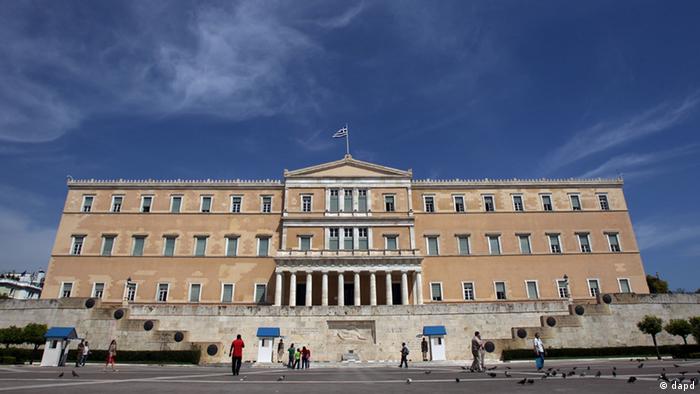Athens has a new government coalition. On Thursday, election winner and head of the conservative New Democracy party, Antonis Samaras was sworn in as prime minister. But his government is not exactly stable.
Aside from the conservatives, the new coalition in Athens is made up of the socialist Pasok party of former finance minister Evangelos Venizelos and the moderate leftist party Democratic Left. Together, the three parties have a broad majority of 179 out of 300 seats in the Athens parliament. The two leftist junior coalition partners, however, will not field any of the ministers for the new cabinet.
In an almost passionate statement after his swearing in ceremony, new Prime Minister Samaras appealed to the patriotism of the Greek people.
"I ask the Greek people to show patriotism, to stay united and to give me their trust that with God's help we will do everything we can to take the country out of the crisis," the 61-year-old said. "Tomorrow, I will ask the government to work hard to give tangible hope to the Greek people. I have the majority to form a long-term government of stability and hope."
Debates on reforms and immigration

Samaras is confident his government will bring stabiltiy and hope
The exact form the cabinet will take won't be decided before Thursday. The parties still have a number of issues on which they disagree. The conservatives find it easier to get behind the privatizations and labor market reforms agreed on with Brussels. There's also disagreement over immigration. The Democratic Left is against the proposal by Samaras to withdraw a law which makes it easier for second generation immigrants to get Greek citizenship.
Both coalition partners are careful not to get too involved in the new government. Commentators suspect that especially socialist Pasok, received its worst ever election result last Sunday, is eager to not take on too much of the responsibilities in the new government. Socialist parliamentarian and former minister Nikos Sifounakis however rejects such claims
"It is in line with our constitution that the party that had the majority in the election is also carrying the main responsibility in forming the government," Sifounakis said in a TV interview. Of course Pasok would support the new government, he continued. But the socialists also have to reorganize themselves and try to win back voters they lost to the radical left, Sifounakis added.
Power struggle with Brussels

Venizelos' socialist Pasok party is still reeling from its worst ever election result
While Pasok will be busy strengthening its socialist profile, the new cabinet will include independent economic experts alongside the conservatives. The finance ministry, for instance, will be headed by economics professor Vassilis Rapanos, head of the Greek national bank. His deputy will most likely be the current finance minister of the interim government, Jannis Zanias. As Rapanos has not been sworn in yet, it will be Zanias who will represent Greece at the Eurogroup finance ministers meeting on Thursday.
At that point, there might be the first talks with EU partners about possible changes to the conditions the EU has imposed on Greece in return for helping the struggling country. The Samaras government, it is believed, may ask for postponing the austerity measures by at least two years. The new prime minister in his election campaign also promised that he would renegotiate the nature of the reform program as such. On election night, however, he was careful not to bring this issue up again. Instead, he said that Greece would stick to the agreements.
Samaras' statement was immediately met with condemnation by Alexis Tsipras of the radical left Syriza alliance who will be the main opposition force in the new parliament. Syriza will watch closely whether or not Samaras keeps his promise to renegotiate the reform package, said Syriza's economics expert, Eukleidis Tsakalotos.

Tsipras warns he will make the government stick to its promises
"It is important that politicians will say the same after the elections as what they did before the vote," Tsakalotos said. That's why Syriza would insist that the conservatives and their coalition partners stick to their election promises. Their election campaign had been based on saying they'd do a better job renegotiating with Brussels than the radical left. "So if that's what they'll actually do, they'll have nothing to fear from us. But if they don't, then they will have all of society against them," he warned.
Balance between reform and party tradition
The new coalition will be forced to perform a political balancing act. On the one hand there's a lot of homework to take care of, on the other hand, the three parties that make up the coalition want to renegotiate the austerity program imposed by the EU. As the smallest party in the coalition, the Democratic Left has to define itself against other leftist political alternatives. As a consequence, it will likely see its job as reminding the Samaras government again and again to stick to that promise to renegotiate with Brussels. Lawyer and political analyst Antonis Papagannidis therefore thinks it's not unlikely the new government will soon show the first cracks.
"It is quite telling that two of the three parties don't field ministers from their ranks. In other words, they pretend they don't have all too much to do with the whole affair," Papagiannidis told Greek television. The crucial test for the coalition would come in the next weeks. Then, the members of parliament will have to abandon any populist rhetoric and vote in favor of the painful but necessary reforms.
Author: Jannis Papadimitriou, Athens /ai
Editor: Spencer Kimball
Editor: Spencer Kimball

No comments:
Post a Comment